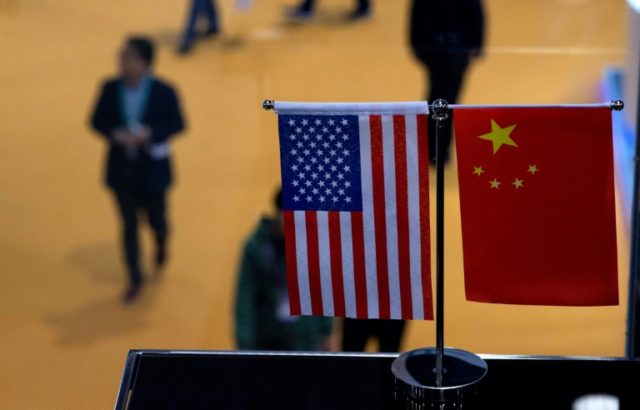Chinese media is stepping up its criticism of U.S. policy as motivated by paranoia and envy of China’s growing global influence.
On Friday, Chinese Foreign Ministry spokesman Lu Kang professed outrage over the U.S. State Department raising its travel advisory for China, as related by the Global Times:
China’s Foreign Ministry responded strongly to the US travel warning on China by saying that Washington has often set obstacles in the path of Chinese nationals traveling to the U.S., not the other way around.
The number far exceeds people who traveled from China to the US, which is the best proof to show whether China is safe or not, said Lu, noting he hopes the US can do something to boost two peoples’ mutual trust, not the contrary.
His comments came after the US State Department on Thursday updated its travel warning about China, urging Americans to “exercise increased caution” in the country “due to arbitrary enforcement of local laws as well as special restrictions on dual US-Chinese nationals.”
It said that China uses exit bans coercively “to compel US citizens to participate in Chinese government investigations, to lure individuals back to China from abroad, and to aid Chinese authorities in resolving civil disputes in favor of Chinese parties.”
China welcomes foreign citizens, including US citizens to visit, and will protect their safety, legal rights and freedom of entry and exit from the country, said Lu, noting that at the same time, China hopes foreigners can respect and obey Chinese law.
On the subject of China abusing exit bans as the State Department charged, Lu insisted the bans are issued only to “compel US citizens to participate in Chinese government investigations, to lure individuals back to China from abroad, and to aid Chinese authorities in resolving civil disputes in favor of Chinese parties.”
The Global Times criticized U.S. media for “hyping up the possibility of US executives being detained in China after Huawei CFO Meng Wanzhou’s arrest in Canada” and approvingly quoted Apple CEO Tim Cook’s statement that he is not apprehensive about traveling to China.
The Chinese paper contrasted this ostensible welcoming spirit of China with the U.S. Reciprocal Access to Tibet Act of 2018, which among other measures could deny Chinese officials entry to the United States if they are involved with efforts to keep foreign diplomats, journalists, and observers out of Tibet.
An op-ed at the Chinese Communist People’s Daily fulminated over Acting Defense Secretary Patrick Shanahan telling Pentagon officials last week to “remember China, China, China” as a top national security concern.
People’s Daily Online responded by quoting soothing claims from the very same Chinese Foreign Ministry spokesman, Lu Kang, to the effect that China’s vast and growing military is “purely defensive in nature” and China desires nothing but win-win cooperation with other great powers, including the United States.
The Chinese paper found an ally in former president Jimmy Carter:
By telling top U.S. officials to emphasize “China, China, China,” Shanahan has fallen victim to the dangerous notion that China is a threat to the future security and prosperity of the United States and is trying to steer the United States away from deeper engagement and cooperation with China and toward a more troubling future of long-term, strategic competition. His comments reflect growing fear and paranoia about China’s rise and the feeling of insecurity in the United States about its position vis-à-vis China.
This type of thinking at the highest levels of the US government is indeed dangerous, as was pointed out by Jimmy Carter, the 39th president of the United States, who, in an op-ed for The Washington Post, warned about how some people in the US government are trying to frame the China-US relationship in a dangerous way, pointing to official reports that declare that China is out to challenge the United States for dominance and that China is trying to drive the United States out of Asia and reduce its influence across the globe.
The former US president was referring to, among other reports and comments, the Trump Administration’s National Security Strategy (NSS), which sets the stage for a brutal Cold War-style competition with China.
The former US president was also referring to people like Shanahan, a high-ranking US official who was intimately involved with the development of at least one of those hawkish reports, the National Defense Strategy (NDS), which declares China as a long-term, strategic competitor and a central challenge to US prosperity and security, and calls for stepping up great power competition with China.
For the record, Carter’s op-ed at the Washington Post zinged the Chinese elite for paranoia as well, although Carter continued his lifelong habit of reserving his strongest criticism for America. He did spare a moment to lament China’s “deficiencies in Internet censorship, policies toward minorities, and religious restrictions,” which he said should be “recorded and criticized.”
Neither Carter nor his admirers at the People’s Daily attempted to refute any of the points about China raised in President Donald Trump’s National Security Strategy, which included a great deal of evidence to back up its contentions about Chinese technology theft, economic warfare, and territorial aggression.
At best, China’s insincere homilies to global free trade, mutual cooperation, and information security are attempts to browbeat the world into forgetting what China has done over the past few decades, and most definitely retains the capability to do again.
No matter how many Chinese officials and editorials claim it is entirely up to the United States to choose between rewarding cooperation and a new Cold War, the fact is that China initiated the conflict it now denounces as destructive, and only under the extreme pressure of the trade war has it hinted at scaling back its most abusive practices, without ever formally admitting it has done anything wrong.

COMMENTS
Please let us know if you're having issues with commenting.